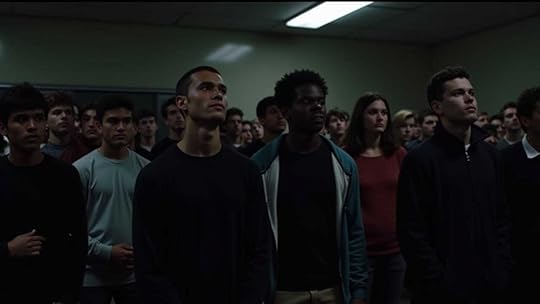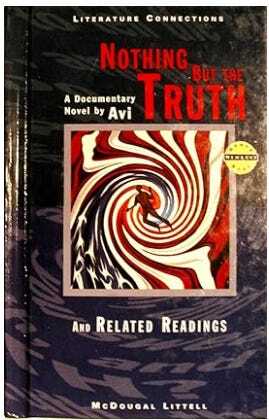3 major messages Nothing but the Truth offers to more than just libertarians

In a previous article, I went over a hidden message in Nothing but the Truth that libertarians would find enticing. But there are also more blatant messages and themes that a growing number of people, not just libertarians, can appreciate.
And yes, these three messages will bode well with libertarians, as we’ve seen all three of them played out during the first half of the 2020s more than perhaps any other time in American history. Okay, maybe that’s subjective, but you get the point.
The Libertarian Book Reviewer is a reader-supported publication. To receive new posts and support my work, consider becoming a free or paid subscriber.
We’ve seen politicians and so-called “experts” try to lie their way out of a bad situation, all while their media allies went to bat for them. And finally, we were all expected to trust them and their political allies in Washington, all of which wreaked havoc on the average American.
Such a fiasco may not be easy for young people to grasp. Luckily for us, Nothing but the Truth is a fine way for young readers to better understand these more complex situations.
So, let’s dive in.
Never try and lie your way out of a situationI’ve always lived by this mentality: If you lie, you’re gonna have to lie again, then lie again, and keep lying to cover up the original lie as the snowball effect builds. It’s something that would’ve done Philip Malloy well. Here’s a brief timeline of how his lies played out:
Hummed the National Anthem, but claimed he was singing the National Anthem
Philip repeated this lie to his parents, Ted Griffen, and journalist Ms. Stewart
Ms. Stewart wrote a slanted article in Philip’s defense
Article gained national attention, leading to near-universal support for Philip
Philip’s teacher, Margaret Narwin, faced criticism that led to her ultimate resignation
Narwin’s resignation made Philip Public Enemy No. 1 once he returned to school
Rumors swirled that students were starting a petition to force the truth out of Philip
Philip refused to return to school and instead switched schools
At his new school, Philip was asked to lead his new class in the singing of the National Anthem
Philip is then forced to admit the truth, stating, “I don’t know the words.”
I said in yesterday’s piece this entire situation could’ve been avoided if Philip had more options to work with as opposed to switching to another teacher, from whom he’d have been expected to learn the same material, or switching to a heavily regulated private school.
Still, had Philip simply told the truth and admitted he was trying to annoy Miss Narwin because he disliked her, the situation could’ve been avoided. Yeah, I get it, when you’re a ninth grader, facing the truth might be tough, but this book serves as a strong lesson that should encourage kids to look past the moment.
Thanks for reading The Libertarian Book Reviewer! This post is public so feel free to share it.
Tell the truth and face short-term consequences and long-term growth. Lie, and face short-term benefits and long-term consequences when that lie is finally unearthed. Broader options as opposed to what we traditionally see in schools would’ve helped for sure, but it still doesn’t excuse Philip from fooling the entire nation.
Trust the media at your own riskMs. Stewart was a local journalist and an ally of Ted Griffen’s who listened to and wrote a slanted story on Philip’s experience in Narwin’s class. At this point, Philip led his parents, Griffen, Stewart, and ultimately America into believing that he got suspended for singing the National Anthem as opposed to humming it.
That article hit the local papers, which was bad enough for all the parties involved, including Dr. Joseph Palleni, Dr. Gertrude Doane, and, of course, Narwin. But the article soon gained national attention, both in the papers and even on talk radio.
While Philip received letters and telegrams supporting him from people all over the country, Narwin became a national outcast and instead got scathing remarks. Stewart got her facts wrong, thanks to Philip’s victim mentality, and her article demonized who was implied to be the most popular and longest-tenured teacher at the school.
This one serves as a warning of why it’s not always wise to trust the media, especially those who have a clear-cut bias or even mistake the facts. Here, Stewart did try talking to all parties involved, but she ultimately only got one side, the wrong side, of the story. Still, she never got the full story, and wrote the article anyway.
Never put blind belief into politiciansTed Griffen might be my least favorite character in the book, and for good reason: He’s a local politician running for the school board who’s willing to ‘bend’ the truth to get his position. In the book, Griffen uses Philip Malloy’s lie as a platform for election, but it doesn’t come without him putting his own spin on it.
Malloy, who received a two-day suspension for humming the National Anthem - seen as creating a disturbance - in Margaret Narwin’s homeroom class, was never suspended in Griffen’s eyes. Instead, Griffen claimed Malloy was “expelled” for singing the National Anthem.
This is something you might miss, since Avi has a tendency to slip different words and phrases into the work. But when you listen to (or read) Griffen’s speeches closely, you’ll see that he claimed Malloy was ‘expelled,’ before going on a rant about how he’ll implement something along the lines of patriotic American values in the school district.

We never know if Griffen followed through on this, but he was persuasive enough to win the election.



